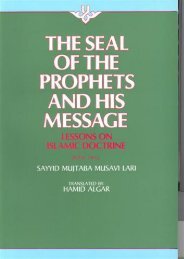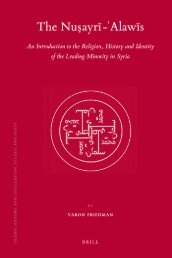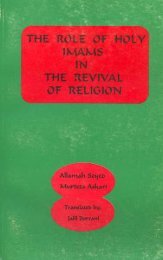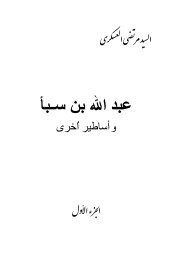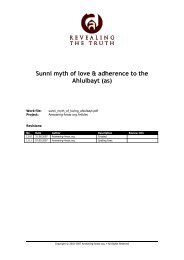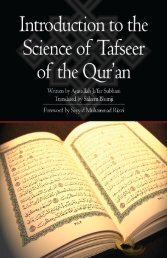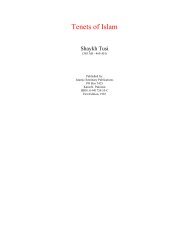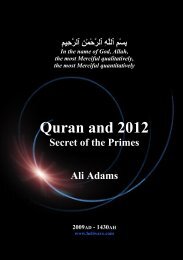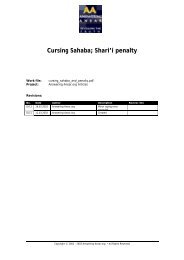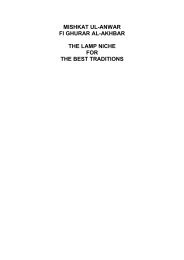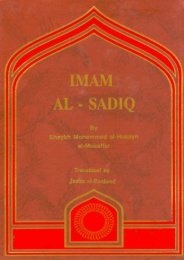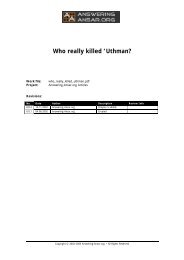Ain Al-Hayat, The Essence of Life.pdf - Higher Intellect | Content ...
Ain Al-Hayat, The Essence of Life.pdf - Higher Intellect | Content ...
Ain Al-Hayat, The Essence of Life.pdf - Higher Intellect | Content ...
- No tags were found...
Create successful ePaper yourself
Turn your PDF publications into a flip-book with our unique Google optimized e-Paper software.
<strong>The</strong> Prophet (a.s.) also said,” Prevent yourself from your father’s curse. It is sharper<br />
than the spear!”<br />
• It has come in the traditions that four types <strong>of</strong> prayer are not rejected by <strong>Al</strong>lah::1.<br />
A father’s prayer.for his son. 2. Prayer <strong>of</strong> the oppressed against the oppressor. 3.<br />
Prayer <strong>of</strong> the person who is on the minor pilgrimage (Umrah). 4. <strong>The</strong> prayer <strong>of</strong> a<br />
person who is fasting.<br />
• It is said that the prayers <strong>of</strong> five types <strong>of</strong> persons are not answered: 1. A husband,<br />
despite being capable <strong>of</strong> divorcing a nagging spouse by giving her the mehr<br />
(alimony), bears with her and doesn’t divorce her, but prays against her.. 2. A<br />
person whose slave had escaped from his custody thrice but he doesn’t sell him<br />
and just curses him. 3. A person who doesn’t walk hurriedly away from a wall<br />
precariously about to fall and prays,’ O <strong>Al</strong>lah! May the wall not fall on my head!’<br />
4. A person who advances a loan to someone without taking any witnesses and<br />
then prays, ‘ O <strong>Al</strong>lah! Get back my money to me!’ 5. An able bodied person<br />
capable <strong>of</strong> earning his livelihood, but doesn’t exert himself to earn, prays’ O<br />
<strong>Al</strong>lah! Give me livelihood!’<br />
• <strong>The</strong> Prophet <strong>of</strong> <strong>Al</strong>lah (a.s.) has said, O Abu Dhar! If in a town only disobendient<br />
sinners are there with only three pious persons, <strong>Al</strong>lah will not send curse to that<br />
place.<br />
• O Abu Dhar! <strong>Al</strong>lah is proud and appreciatve <strong>of</strong> three persons. <strong>The</strong> first: One who<br />
says the Adhan (call for prayer) and Iqamah (the call to rise for prayer) while<br />
alone in a forest and <strong>of</strong>fers his mandatory prayer. <strong>Al</strong>lah asks the angels with pride<br />
to look at his sincere creature who has not forgotten the Creator even in the<br />
loneliness <strong>of</strong> the jungle. <strong>The</strong> second: One who does the Namaz e Shab (the night<br />
prayers) and prostrates in the loneliness <strong>of</strong> the night despite being overwhelmed<br />
by sleep. <strong>Al</strong>lah tells to the angels that the spirit <strong>of</strong> the sincere creature is with<br />
Him while he is in prostration. <strong>The</strong> third: A person on the battlefield steadfast<br />
fighting the enemies while his own comrades have fled with fear in their hearts!: .<br />
• Imam Jafar e Sadiq (a.s.) narrates that <strong>of</strong>fering mandatory prayers in the view <strong>of</strong><br />
the people is preferable. Praying in the mosque is preferable to praying in the<br />
loneliness <strong>of</strong> the home. Similarly giving Zakat in the precincts <strong>of</strong> the mosque is<br />
better as it would encourage others to follow suit. <strong>The</strong> non-mandatory prayers<br />
and charity and alms to poor and needy is better given in privacy. This will<br />
preclude the chance <strong>of</strong> giving a feeling to the people that the person is proud <strong>of</strong><br />
his status and the recepients <strong>of</strong> the help might also feel embarrassed if the help is<br />
pr<strong>of</strong>erred in public.<br />
• <strong>The</strong>n the Imam (a.s.) said,” Offering namaz e shab was the practice <strong>of</strong> the<br />
Prophet (a.s.) and the pious persons followed suit. It removes pains and makes<br />
the faces radiant. One who <strong>of</strong>fers these nightly prayers becomes good-natured<br />
and presentable. It boosts the means <strong>of</strong> livelihood <strong>of</strong> the person. <strong>The</strong> eight rakaat<br />
(genuflections) <strong>of</strong> namaz e shab are the adornment <strong>of</strong> the Hereafter for one who<br />
<strong>of</strong>fers these prayers. It gives light to the eyes and expels sadness.”<br />
• It is mentioned in the traditions that namaz e shab enhances the radiance <strong>of</strong> the<br />
face and the fragrance <strong>of</strong> the body. It gives boost to the person’s livelihood. <strong>The</strong><br />
person who <strong>of</strong>fers these prayers finds means <strong>of</strong> discharging his debts.



